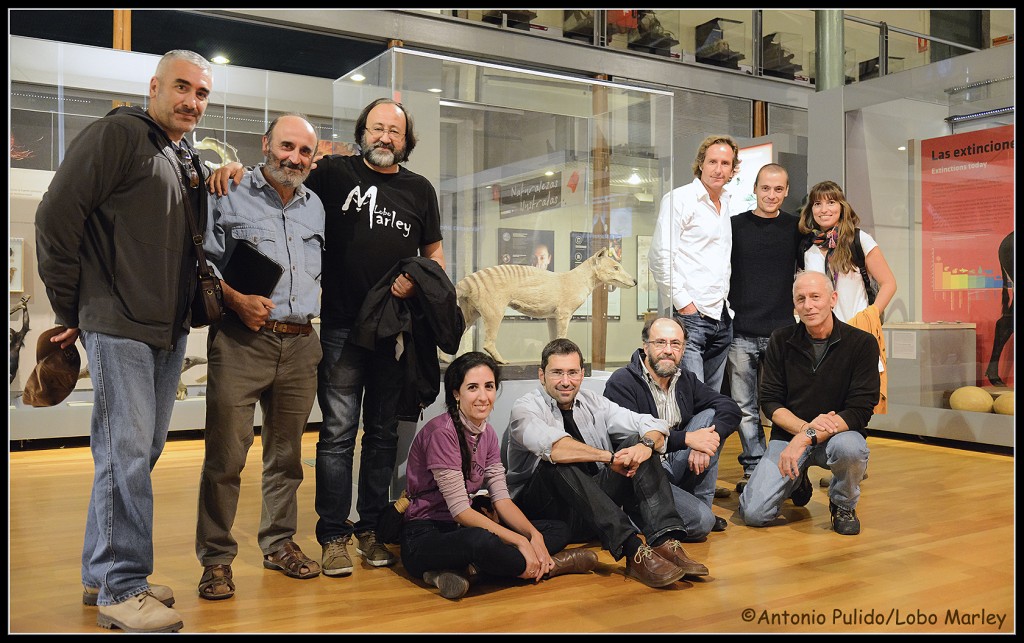
On Nov. 1st 2014 a historic meeting, organized by the Spanish conservation group Lobo Marley, took place in the National Museum of Natural Science, Madrid, in which conservation of the Iberian wolf symbolically crossed the imaginary human boundaries.
In the course of this meeting, scientists and conservationists from Portugal, France, Germany and Spain discussed and defined different short-, medium- and long-term goals and strategies, directed towards the conservation and transboundary protection of the endemic Iberian Wolf subspecies Canis lupus signatus.
LoboMarley – Citizens for the support of the Wolf and the Rural World, intimately familiar with the problems associated with the conservation of Wolves in Spain, managed last year to collect almost 200.000 signatures of concerned European citizens, expressing their oposition against the killing of wolves in Spain. The petition was presented lateron to the European Parlament, obtaining the unanimous support of various European political groups.
Based on this widely supported campaign as well as on the contratictory conservation status of wolves within the two EU member States Portugal and Spain, a letter outlining the shortcommings and inherent problems related to the inconsistend wolf management practices on the Iberian Peninsula was elaborated by six EU MPs (Sandrine Bèlier, Raul Romeva, Carl Schlyter from EU Green Party; Francisco Sosa Wagner from UPyD; Kriton Arsenis from Group of Progressive Alliance of Socialists and Democrats; Andrea Zanoni from Alliance of Liberals and Democrats of Europe) and summited to the EU Commision, responsible for all conservation related issues in Europe and the implementation of the Natura 2000 guidelines within all EU Member States.
Despite of the foreseeable detrimental consequences of the current wolf management practices for the long-term survival of wolves in Spain rigorously outlined in the submitted document, the Spanish government and especifically the autonomous provinces of Castilla y Leon and Asturias, still give in to the pressure of agri-business and hunting lobbies and not only tolerate the widespread poaching of wolves, but even issue unjustified and scientifically unsustained hunting quotas, undermining thereby the guidelines of the European Natura 2000 Directive for threatened species.
The continuous large-scale legal and illegal persecution of wolves in the northern provinces thereby effectively prevents the natural dispersal of the species into its former southerly home range where presently only a highly inbred, minuscul group of Iberian wolves survive.
In the future, Lobo Marley will therefore continue it`s fight to reach its outspoken goal, namely a complete legal protection status for the Iberian wolf, as it has been installed in in Portugal since 1988 with the support of the Portugese Government, the majority of it`s citizen and the considerable financial backing from the European Government (within the framework of a LIFE Project).
Paradoxically, the same wolves which are currently protected in Portugal under Portuguese and European law, are still «legally» hunted in some Spanish provinces once they cross the border from Portugal onto Spanish territory, thereby wasting millions of Euros of EU tax money dedicated towards the protection of wolves in Portugal.
In our opinion, any successful wolf conservation on the Iberian Peninsula can only be achieved, if the species Canis lupus signatus will be legally protected in its entire range, that is, in Portugal AND in Spain. In order to reach this goal, it is important that, the different autonomous Spanish provinces immediately refrain from implementing their own selfish and unsustainable wolf management practices and that a new vison of the wolf is created in professional circles as well as in the whole Spanish society.
The wolf needs to be recognized (again) as one of the most important key stone species for the development of healthy ecosystems and as a possible source of economic prosperity for rural inhabitants which will undoubtedly benefit in the future from the development of specialized eco-tourism businesses using the presence of free-living wolves as a highly important marketing tool.
The photo attached to this article shows the participants of the first international meeting organized by LOBO MARLEY. However, LoboMarley`s team counts many more members and most of them are equally dedicated and actively involved in the struggle to provide a safer future for wolves throughout the Iberian Peninsula.
As happened to many other, way more famous and gifted conservationists, who in the past have dedicated their time, energy and personal skills to preservation of iberian wild species and the beauty of its landscapes, (e.g Josè Antonio Valverde, Francisco Bernis, Luc Hoffman, Sir Julian Huxley or Felix Rodrigues de la Fuente), also Lobo Marley`s current effort to achieve the legal protection status of wolves throughout the Iberian Peninsula, is still looked upon with suspicion and is rediculed even by supposedly conservation-minded professionals and lay persons alike.
However, we are convinced that, this difficult task is a necessity in order to prevent the Iberian wolf from suffering the same fate as the Marsupial Wolf of Tasmania, serving as the backdrop of the team photo below.
The struggle is unfair and uneven but for my children, for yours, for to those who I don’t know, for all of them I cannot, we cannot but go ahead and shout ¡Viva la Naturaleza! ¡Viva el Lobo!


